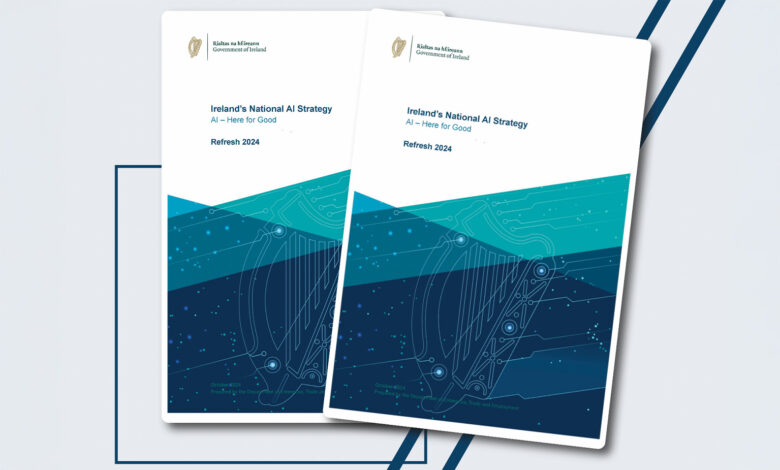National AI strategy refreshed following EU AI Act passage

The 2024 refresh of Ireland’s National AI Strategy emphasises adapting regulatory frameworks to address rapid advancements in AI technology while aligning with the European Union’s AI Act.
One of the primary objectives of Ireland’s updated AI strategy is fostering public trust through transparency and ethical use. The strategy highlights measures such as rolling out AI standards and certifications, guided by the EU AI Act, which underlines the importance of member states adopting a risk-based approach to AI regulation.
The refresh aims to balance the innovation opportunities of AI with safeguarding fundamental rights, ensuring that businesses and public entities operate within ethical and safe frameworks.
Strengthening AI governance
The Government aims to strengthen its AI governance through the establishment of structures like the AI Advisory Council. This body provides independent advice, aimed at helping the government navigate emerging challenges in AI adoption. It also advocates for transparency and accountability in public service AI deployments.
Notably, responsibility for ethical AI use is placed on system users, not developers, underscoring the importance of informed adoption practices by public and private entities.
Implementing the EU AI Act
The focal point of the refresh is to fully incorporate the EU AI Act, which was formally passed after the Government’s AI strategy, AI: Here for Good.
By categorising AI applications based on risk – ranging from minimal to high – this aims to minimises obligations for low-risk systems like administrative tools while imposing stringent requirements on high-risk uses, such as AI for recruitment or credit assessments.
Under the new regulations, the Government aims to lead in implementing regulations under the AI Act while introducing regulatory sandboxes to enable safe, innovative experimentation within controlled environments.
Speaking to eolas Magazine in February 2024, following passage of the AI Act, Government Chief Information Officer, Barry Lowry, said that he was “very pleased to note the progress made with the EU AI Act”.
“I think it has evolved well to now provide a very good balance between meaningful AI use and risk and privacy management. I look forward to its enactment,” Lowry said.
As the EU AI Act was being drafted, Lowry had warned in a previous interview with eolas Magazine (issue 60) that “there is a risk that misunderstood attempts to regulate AI are viewing AI as an entity, but it is not about AI as an entity, it is about how you use it”.
Lowry had further warned of the potential risks of introducing legislation “without a real understanding of what it is that is being regulated” and “without talking about shared risk”.
“I think it has evolved well to now provide a very good balance between meaningful AI use and risk and privacy management.”
Regulation challenges
Implementing a universal framework for such a diverse technology poses challenges. AI’s dynamic nature makes it difficult to craft regulations that are both specific and adaptable.
For example, concerns over facial recognition technology highlight tensions between technological potential and privacy rights. These discussions underscore the delicate balance between the commitment to addressing nuanced ethical concerns while fostering AI adoption.
To support businesses, especially SMEs, the Government offers tools like the Grow Digital Portal and training programmes through CeADAR and other European Digital Innovation Hubs. These initiatives aim to provide access to resources like digital maturity assessments and AI integration workshops. Furthermore, the Government is encouraging collaboration across public and private sectors to maximise “the economic and societal benefits of AI”.
In the public sector, AI’s integration is designed to enhance service delivery while maintaining ethical safeguards. Initiatives like curated chatbots for government websites and AI-assisted healthcare diagnostics demonstrate potential gains in efficiency and accessibility.
The strategy ensures ethical alignment by requiring senior management to oversee and approve AI implementations, emphasising user accountability.
Overall, the aim of these new AI regulations is to drive innovation within regulated environments by leveraging resources like regulatory sandboxes, while building public trust through transparent and ethical AI use.
Through this, it is hoped that the refresh to the national AI strategy will help to foster talent and skills in AI through targeted educational initiatives, ensuring workforce readiness.
Speaking shortly prior to the publication of the refresh in November 2024, Minister of State Dara Calleary TD told eolas Magazine: “The refresh builds on the solid foundations in place, continuing to emphasise the importance of trustworthy, person-centred AI development and use, while positioning Ireland as a leader in seizing AI’s economic and societal benefits. To achieve these goals, the full engagement and participation of all parts of the public sector is absolutely crucial.”






